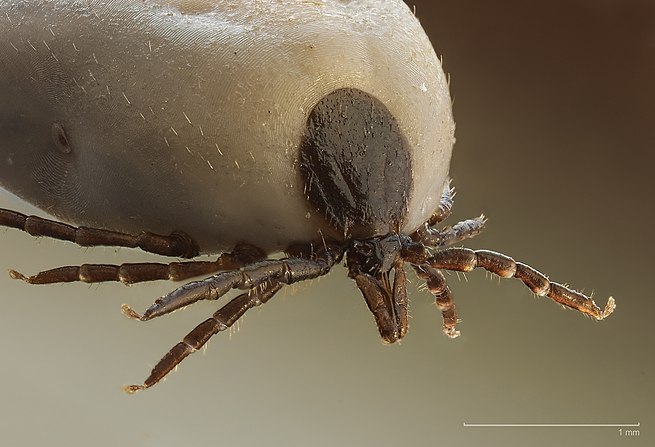
Main Difference
The main difference between Tic and Tick is that the Tic is a repetitive, nonrhythmic motor movement or vocalization involving discrete muscle groups and Tick is a order of arachnids.
-
Tic
A tic is a sudden, repetitive, nonrhythmic motor movement or vocalization involving discrete muscle groups. Tics can be invisible to the observer, such as abdominal tensing or toe crunching. Common motor and phonic tics are, respectively, eye blinking and throat clearing.Tics must be distinguished from movements of other movement disorders such as chorea, dystonia, myoclonus; movements exhibited in stereotypic movement disorder or some autistic people, and the compulsions of obsessive–compulsive disorder (OCD) and seizure activity.
-
Tick
Ticks are small arachnids, typically 3 to 5 mm long, part of the order Parasitiformes. Along with mites, they constitute the subclass Acari. Ticks are ectoparasites (external parasites), living by feeding on the blood of mammals, birds, and sometimes reptiles and amphibians. Ticks had evolved by the Cretaceous period, the most common form of fossilisation being immersed in amber. Ticks are widely distributed around the world, especially in warm, humid climates.
Almost all ticks belong to one of two major families, the Ixodidae or hard ticks, and the Argasidae or soft ticks. Adults have ovoid or pear-shaped bodies which become engorged with blood when they feed, and eight legs. As well as having a hard shield on their dorsal surfaces, hard ticks have a beak-like structure at the front containing the mouthparts whereas soft ticks have their mouthparts on the underside of the body. Both families locate a potential host by odour or from changes in the environment.
Ticks have four stages to their lifecycle, namely egg, larva, nymph, and adult. Ixodid ticks have three hosts, taking at least a year to complete their lifecycle. Argasid ticks have up to seven nymphal stages (instars), each one requiring a blood meal. Because of their habit of ingesting blood, ticks are vectors of at least twelve diseases that affect humans and other animals.
-
Tic (noun)
A sudden, nonrhythmic motor movement or vocalization.
-
Tic (noun)
Something that is done or produced habitually or characteristically.
-
Tic (noun)
ticket
-
Tic (verb)
To exhibit a tic; to undergo a sudden, semi-voluntary muscle movement.
-
Tick (noun)
A tiny woodland arachnid of the suborder Ixodida.
-
Tick (noun)
A relatively quiet but sharp sound generally made repeatedly by moving machinery.
“The steady tick of the clock provided a comforting background for the conversation.”
-
Tick (noun)
A mark on any scale of measurement; a unit of measurement.
“At midday, the long bond is up a tick.”
-
Tick (noun)
A jiffy (unit of time defined by basic timer frequency).
-
Tick (noun)
A short period of time, particularly a second.
“I’ll be back in a tick.”
-
Tick (noun)
a mark (✓) made to indicate agreement, correctness or acknowledgement; checkmark
“Indicate that you are willing to receive marketing material by putting a tick in the box”
-
Tick (noun)
A lifer (bird seen by a birdwatcher for the first time) that is uninteresting and routine, thus merely a tick mark on a list.
-
Tick (noun)
The whinchat; so called from its note.
-
Tick (noun)
Ticking.
-
Tick (noun)
A sheet that wraps around a mattress; the cover of a mattress, containing the filling.
-
Tick (noun)
Credit, trust.
-
Tick (noun)
A goat.
“Tickhill; Tickham; Ticknock; Tickenhall Drive; Tickenhill Manor; Tickenhurst”
-
Tick (verb)
To make a clicking noise similar to the movement of the hands in an analog clock.
-
Tick (verb)
To make a tick mark.
-
Tick (verb)
To work or operate, especially mechanically.
“He took the computer apart to see how it ticked.”
“I wonder what makes her tick.”
-
Tick (verb)
To strike gently; to pat.
-
Tick (verb)
To go on trust, or credit.
-
Tick (verb)
To give tick; to trust.
-
Tic (noun)
a habitual spasmodic contraction of the muscles, most often in the face.
-
Tic (noun)
an idiosyncratic and habitual feature of a person’s behaviour
“they’ve developed a verbal tic which involves repeating odd bits of each other’s utterances”
